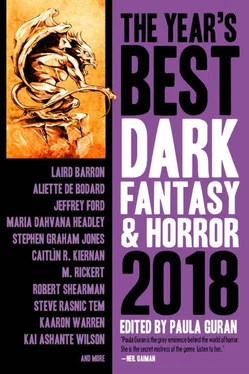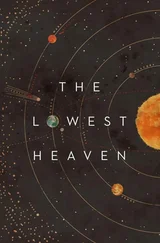In all my years I’ve never seen a girl worthy to take my place, never saw in another face whatever the Sea Witch saw in mine. Whether that’s good or bad I do not know, I only know that a broken bargain will make a witch do terrible things. Like this.
She’s ragged and lovely, my daughter; at last I have her voice. When I put that inside her she’ll lack just one final thing: life. And when I breathe that into her—when I give up the core of my very best self—she’ll take my place.
Imagine: all that loss, all that sacrifice and grief, all those pieces of self, exiled from their very being. Imagine: all that rage. Imagine: my last breath, my last desire, my final instruction and knowledge of my home; my sister, the broken bargain.
Imagine her, my child, my girl, my successor.
She will be terrible.
And I will be free.
They find the bottle in the barn. There are a lot of things there, whole piles of things: tractor-part things, tire things, cutting things and bolting things, all tired things, slowly fading toward the same color of rusty brown. The inside of the barn smells of stale hay and beer. Misty picks the bottle that is the least broken and William holds it between two fingers and lets the water drain from its open mouth onto the packed-earth floor. The base of the bottle has a deep crack running through it that snakes along the length, almost all the way through. The crack raises up a little, just enough to tear their skin if they aren’t careful.
They sit so their bodies form a triangle, William and his best friend Misty and her sister Penny. They sit in the corner of the barn, there among puddles of something that might be water. This way, no one can see them from the road. It’s William’s idea. The whole game is William’s idea.
The bottle spins and spins and they kiss what they are given. Wooden beams. Metal pipes. Once, for William, a grasshopper. The bottle seems to find only the gaps between them, the space that separates their knees from other knees. It doesn’t land on a Body, not the whole time they are playing, even though William moves them three times, convinced that it’s the ground or the shadows or the moisture from the puddles that is warping the bottle’s path, but nothing changes.
They decide there will be one last spin, and William reaches out, and William is sure this will be the spin that changes the game, when a car pulls into the driveway and a voice calls, “Penny! Misty!”
The girls are gone before William can ask them to stay. Only Misty pauses in the doorway to wave, and William waves back. He listens to their mother’s voice, to the rustle of grocery bags, the slam of a trailer door. He waits until he can hear the water in the creek near his house. Then he spins the bottle one last time. The glass clinks and grinds over the dirt, kicking up breaths of dust so small that you have to squint to see them. The bottle stops with the mouth pointing at William’s knee.
When the girls are gone, William sits by the barn door, which is always open, propped on two crumbling cinder blocks. He watches Earl, whose trailer sits behind William’s, by a field that Earl tilled many years before. In all ten years of William’s life, he has never seen a single thing grow in the field. There is a word for places where things don’t grow. William’s mother taught it to him. Fallow, she said, and said it again when William asked her to. He liked the way it sounded, a little like hollow, or holy. He said it to himself sometimes, at night, repeating it over and over just to feel the letters rolling on his tongue.
The fact that nothing has ever grown in the field doesn’t discourage Earl, who is bent double over the plow, driving it into the soil. The dirt gives on either side of the blade, opening up, gutted. The earth exhales a damp smell. Creek water and must. Earl keeps going. William spins the bottle again and again and it lands, every time, with its mouth pointed at his knee. Earl plows and plants until the sun begins to set and then he curses and walks to his trailer. Without him, the quiet takes over the field, and the crickets are born out of the quiet, bringing noise.
Earl pauses at his trailer door, squinting to see William in the shadows of the barn. “You ain’t supposed to be in there,” he says.
“I know.”
“Well.” Earl looks toward the trailer he rents to William’s mother. There’s no car in the driveway and no lights in the windows. “Just be careful,” he says. “There’s broken glass and God knows what. You’re liable to catch tetanus or some shit.”
William nods and he waves to make Earl go away, Earl does, waving a broken chain in his hand, thick flakes of dust breaking from its links and falling through the sun-bitten air.
William buries the bottle in the fallow field. If anyone had asked him what he was doing, he wouldn’t have known how to answer. He doesn’t have the words to describe how the field reminds him of himself. The dark shape of it, the earth torn up and left to cool in the dark, a little steam rising. How it feels like maybe the field needs something only William has, and all William has is the bottle.
He waits until Earl shuts the screen door to his trailer, hemming out the darkness and the cool air that it carries. He waits until all he hears is his own breathing and the creek water running, until the two sounds are one sound, the same. Like all he has to do is walk to the creek and open his mouth and a whole stream full of minnows and rocks will come rushing down his throat, running over the bare bones of his ribs, collecting in his fishbowl belly where nothing could ever get out again. William can almost taste the water, sour and green and a little sweet.
William buries the bottle at the edge of the field. The solid door to Earl’s trailer is still open, and the thought of Earl appearing now that he’s had time to drink scares William a little. But burying the bottle only takes a minute. The soil is loose and dark and warm between William’s fingers, and when he is finished, the earth is smooth, like the bottle isn’t there at all, or like it has always been there.
William lives with his mother, who is beautiful, and younger than any other mother William has ever met. Her name is Shannon. She has white-blond hair and a scar in the crook of her arm and even that is beautiful—in the way that it raises up from the rest of her skin, in the way that it curves, in the way that it never changes.
She comes home that night even later than usual. She is smiling though, and she smells like peanuts and sugar. She tells William this is the best date she ever had. That he was tall and wonderful and worked in the mines. That he was in line to be a boss. That he called her “kitten” and took her dancing, like out of a movie, like a real cowboy.
“Have you ever been dancing?” she asks.
William shakes his head. He is sleepy and a little hungry, but more than anything, he is glad that she is home, glad for her noise, which fills up all the empty corners of the trailer. Even the stained yellow carpet seems prettier, golden, as she stands on it barefoot, reaching out her hand to him.
“Dance with me.”
She is a little drunk. A little stumbling. She steps on William’s toes and William laughs. He rests his head in the center of her breasts and closes his eyes and lets her twirl him in slow circles around and around the living room.
William wakes the next morning to the sound of voices. The sound of car tires. A honking horn. He walks barefoot onto the back porch. The air is heavy and mist clings to the tops of the trees. There are more cars outside than he has ever seen and more people, too, gathered around the fallow field. William is shirtless and he feels as though his teeth have been replaced by stones that he has spent the night grinding, grinding into dust.
Читать дальше












